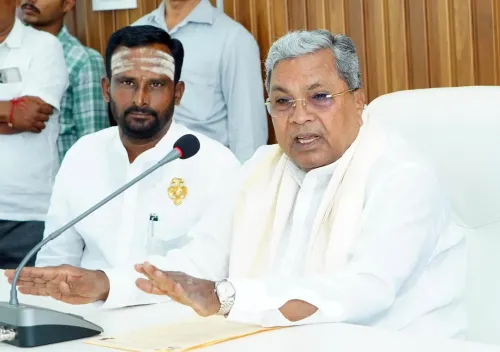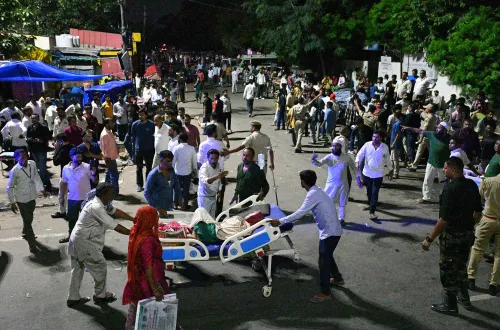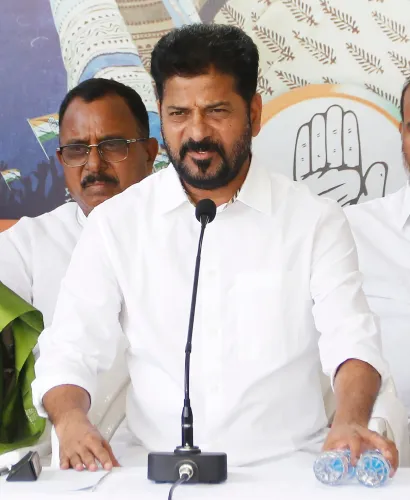Mahayuti's Triumph: A New Era for BJP, Shiv Sena, and NCP Amidst MVA's Setback

Mumbai, Dec 1 (NationPress) The Mahayuti alliance, which consists of BJP, Shiv Sena, and NCP, struck gold in the recent Assembly elections, while the Maha Vikas Aghadi comprising Congress, Shiv Sena UBT, and NCP-SP faced a startling defeat. Mahayuti not only managed to navigate the challenges of anti-incumbency but also strengthened its position by winning a remarkable 236 seats through a display of unity and military-like precision in planning, particularly led by BJP with robust backing from RSS and its affiliates. The successful implementation of various welfare and development programs, including the Ladki Bahin Yojana, along with the tactical use of slogans like 'Batenge To Katenge' and 'Ek Hai To Safe Hai' to attract voters, proved advantageous.
In contrast, the Maha Vikas Aghadi, which had outperformed Mahayuti in the Lok Sabha elections by winning 31 seats, approached the Assembly elections with an overconfident assumption that securing a majority would be straightforward. This coalition appeared fragmented and lacked a solid strategy to capitalize on the anti-incumbency sentiment and public dissatisfaction with core issues. They underestimated the impact of the Ladki Bahin Yojana and failed to present a cohesive agenda.
Although MVA introduced the MahaLaxmi Scheme, promising monthly assistance of Rs 3,000 to women and free transport, it was too late as potential beneficiaries were already content with the financial support received from the Mahayuti government, illustrating a clear choice between continuity and uncertainty. The Mahayuti government had already credited Rs 7,500 (Rs 1,500 per month) for the months of July to November to over 2.34 crore eligible women, along with investments in youth training programs.
Moreover, MVA believed that altering the constitutional narrative and discussing the elimination of reservation policies would resonate well with voters, as it had previously challenged BJP’s claim of winning over 400 seats in general elections. However, Mahayuti, especially Prime Minister Narendra Modi and Home Minister Amit Shah, successfully framed Congress and the INDIA bloc as anti-Constitution and anti-reservation, a narrative that struck a chord with the electorate. During his 10 rallies, the PM strategically avoided directly criticizing Sharad Pawar and Uddhav Thackeray, instead accusing the Congress party of conspiring to fracture society, particularly impacting SCs, STs, OBCs, and tribal communities.
BJP, particularly under RSS's guidance, introduced the slogans 'Batenge to Katenge' and 'Ek Hai to Safe Hai' mid-campaign to consolidate Hindu votes, including Hindu Dalits, tapping into the recent Supreme Court ruling on sub-classification of reserved categories.
Additionally, the BJP enhanced its outreach to OBCs after a disappointing performance in the Lok Sabha elections, conducting over 300 meetings with various OBC sub-castes to mitigate any potential losses from Maratha votes. The party took proactive measures to connect with OBCs through state initiatives and increased financial assistance, aiming to counter the influence of pro-Maratha activist Manoj Jarange-Patil, who had called for opposition against BJP and Devendra Fadnavis during the elections. The Jarange factor, which had significantly influenced MVA's previous success, failed to re-emerge as BJP's pro-OBC strategy yielded notable results for Mahayuti.
Ironically, MVA did not revise its electoral strategy to counter Mahayuti and BJP, failing to realize that constitutional changes, the elimination of reservations, or the Jarange factor would not secure them a majority.
BJP effectively portrayed Jarange-Patil as receiving covert support from Sharad Pawar, accusing him of creating divisions among Maratha and OBC communities for political leverage. Despite Sharad Pawar and MVA's denials of any connection with Jarange-Patil, public perception leaned otherwise. Jarange-Patil's strategy to avoid fielding candidates while promoting the MDM (Maratha-Dalit-Muslim) alliance in Marathwada and beyond did not succeed, whereas OBCs overwhelmingly sided with BJP and Mahayuti, negatively impacting MVA's electoral chances.
Furthermore, Mahayuti successfully placated most rebellious factions by adjusting the seat-sharing dynamics. BJP, consistently presenting itself as the dominant partner, secured a substantial portion of the nominations while allowing some of its candidates to run under the banners of Shiv Sena and NCP. This strategy proved effective as BJP fielded 148 candidates and won 132 seats, with several of its candidates elected through allied parties. BJP and RSS collaborated closely to reach out to nearly one lakh booths, determined to boost turnout by at least 10 percent at each location. After remaining less visible during the Lok Sabha elections, RSS mobilized its resources for the significant victory of Mahayuti and the impressive performance of BJP.
Conversely, MVA took an extended period to finalize its seat-sharing agreement due to personal rivalries, overwhelming ambitions, and significant disagreements over candidate selections. Congress aimed for maximum seat allocation but failed to identify winnable constituencies due to poor candidate choices. Additionally, MVA struggled to manage internal conflicts among rebels and independents, leading to their electoral defeat.
Despite a humiliating defeat in Haryana, prominent leaders, including Rahul Gandhi, did not dedicate adequate time to campaigning, leaving the responsibility to state leaders who could not overcome their factionalism. Congress misjudged BJP's effective strategy of equitable representation across all demographics, resulting in the downfall of key figures like former Chief Minister Prithviraj Chavan and former legislative party leader Balasaheb Thorat. Even in defeat, Congress has yet to address its internal issues, instead launching an anti-EVM campaign.
Similarly, Uddhav Thackeray, who previously capitalized on sympathy during the general elections following the division of Shiv Sena due to Eknath Shinde’s rebellion, could not replicate this during the Assembly elections. He also failed to leverage the legacy of his late father and Shiv Sena founder, Balasaheb Thackeray, despite attempting to evoke his name to gather votes. Under Uddhav Thackeray’s leadership, Shiv Sena managed to secure only 10 seats in Mumbai, facing significant challenges in its traditional strongholds, including the Konkan region.
Uddhav Thackeray must revitalize the party by enhancing its grassroots network and introducing new initiatives. He needs to strengthen his connection with party workers in the upcoming period. Additionally, he faces a critical challenge in winning the Brihanmumbai Municipal Corporation, a position both Shiv Sena (united) and BJP have dominated for over 25 years. The Assembly election results indicate that appealing to the Marathi Manoos sentiment alone is insufficient for Uddhav Thackeray-led Shiv Sena to secure significant victories. The party must revive the Hindutva narrative, clarifying how it differs from BJP’s approach, and adjust its strategy to emphasize Maharashtra's pride.
Eknath Shinde, having won 57 seats, has proclaimed that the election outcomes demonstrate that his faction truly represents Shiv Sena. Uddhav Thackeray is now tasked with a challenging journey to reclaim his party's former prestige.
Regarding Sharad Pawar, he played the role of mediator and coordinator to maintain MVA’s unity during both the general and Assembly elections. He conducted over 70 rallies and sought alliances to confront Mahayuti by focusing on critical issues such as rising unemployment, inflation, farmers' suicides, and the disparity between production costs and farmers' revenues. Nevertheless, despite being portrayed as the Chanakya of state politics, Sharad Pawar could not prevent Mahayuti from achieving remarkable success. At a personal level, his estranged nephew Ajit Pawar, who joined Mahayuti in July 2023, outperformed him by winning 41 seats following a lackluster showing in the general elections. Ajit Pawar has claimed that his faction represents the authentic NCP. Despite the setback, Sharad Pawar remains undeterred and has announced plans to rebuild the party to keep his supporters energized.
In summary, MVA is currently experiencing an existential crisis, with blame shifting between Shiv Sena UBT and Congress for their electoral failures. A faction within Shiv Sena UBT has advocated for contesting future local and civic elections independently, although Congress and NCP(SP) have downplayed these sentiments. The MVA allies face the additional challenge of maintaining active and motivated cadres ahead of local elections and the next Assembly contest. In this scenario, Mahayuti is positioned advantageously and is making significant efforts toward consolidation in Maharashtra. For BJP, this presents an opportune moment to quietly strive towards the objective set by Home Minister Amit Shah of achieving 'Shat Pratishat' post the 2029 elections.
(Sanjay Jog can be contacted at sanjay.j@ians.in)









